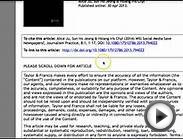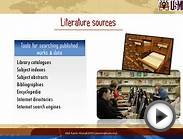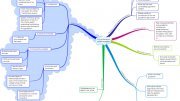 Choosing a general thesis topic is relatively easy, but deciding on specific and realistic research questions requires considerable thought and enquiry. Appropriate and relevant research questions and the methods employed to answer them must be framed in the context of existing research. The dissertation literature review is one of the most demanding tasks in the thesis writing process. Remember that a thorough, refined literature review is the foundation of solid research.
Choosing a general thesis topic is relatively easy, but deciding on specific and realistic research questions requires considerable thought and enquiry. Appropriate and relevant research questions and the methods employed to answer them must be framed in the context of existing research. The dissertation literature review is one of the most demanding tasks in the thesis writing process. Remember that a thorough, refined literature review is the foundation of solid research.
The goals of a literature review
Let's go over what a dissertation literature review should accomplish. It helps in:
- refining the research problem
- seeking new lines of inquiry
- avoiding fruitless approaches
- gaining methodological insights
- identifying recommendations for further research
- distinguishing what has been done from what needs to be done
- discovering important relevant variables
- gaining a new perspective
- rationalizing the significance of the problem
- relating ideas and theory to applications
- placing the research in a historical context to show familiarity with state-of-the-art developments
Preparing to write a literature review
A useful first step when starting your dissertation literature review is to identify relevant "key words" to help navigate your way through the existing literature. When searching for information, remember to give preference to primary research.
Determining which literature is relevant to your research is challenging. The goal of a literature review is to gather a representative collection of the most pertinent material. It is important to accurately document how the material is collected so that others using the same procedure will be able to find the same information. The dissertation literature review is somewhat similar to a major term paper. In order to construct an effective review, you must maintain a coherent and logical progression of ideas. To that end, you might write the title, author(s), and date of each study you wish to include on small index cards. Then summarize the main results of the study in a single sentence. Use these cards to create "reference piles" corresponding to specific sections of the dissertation literature review.
The next stages of the dissertation literature review are: 1) data evaluation, during which you assess the information in the chosen articles; 2) data analysis and interpretation, during which you try to make sense of the extracted data; 3) presentation, during which you determine the most important information to include; and 4) formulating and justifying empirical research questions, during which you explain how your dissertation will make a meaningful contribution to knowledge in your field.
Source: www.scribendi.com
You might also like:



Related posts:
- Literature review Examples
- Literature review Example
- Thesis literature review how long
- Thesis literature review outline
- Thematic literature review Sample















 Part III of the Mathematical Tripos (officially Master of Mathematics/Master of Advanced Study) is a one year Masters-level taught course in mathematics offered at the Faculty of Mathematics, University of Cambridge currently taken by over 200 students each year...
Part III of the Mathematical Tripos (officially Master of Mathematics/Master of Advanced Study) is a one year Masters-level taught course in mathematics offered at the Faculty of Mathematics, University of Cambridge currently taken by over 200 students each year...









yea baby .. match it with coffee !! and make them juice ..